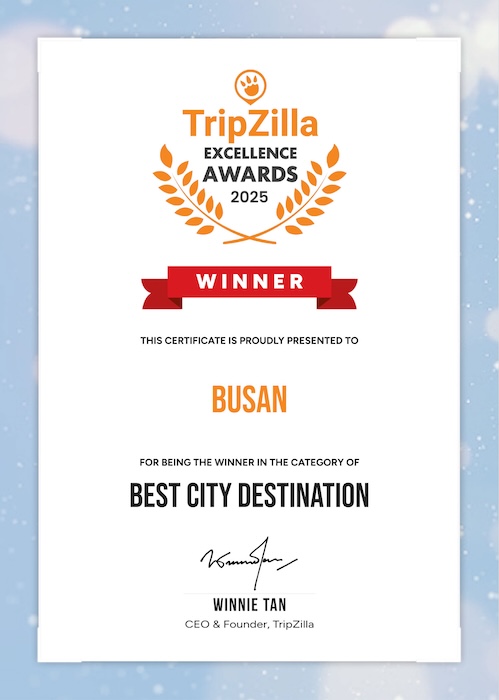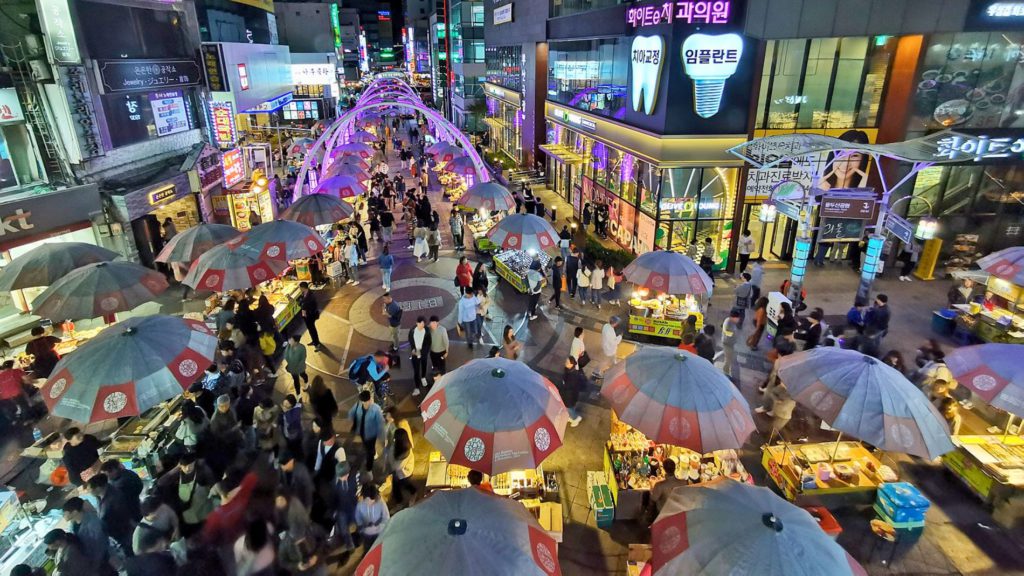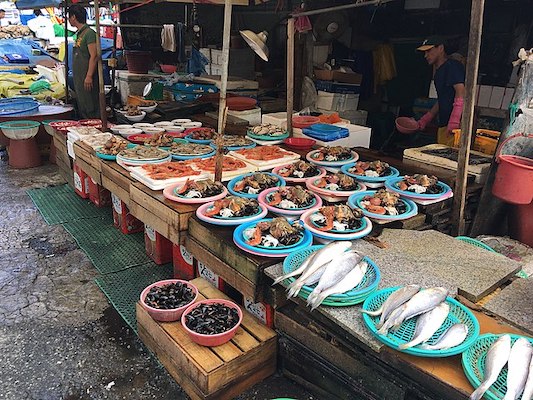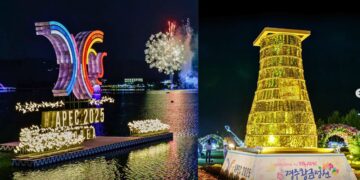Busan has been named the Best City Destination 2025, marking a milestone for Korea’s tourism, economy, and global recognition.
Busan in the Global Spotlight
A New Milestone for Korea’s Coastal City
Busan has captured the world’s attention once again. In its annual Best City Destination Awards 2025, Southeast Asia’s influential travel media platform TripZilla named Busan the Best City Destination, recognizing it as a place “where the ocean meets the skyline.” The city stood out for its stunning coastal views, vibrant energy, and growing appeal among international travelers seeking urban sophistication with a relaxed seaside spirit.

This recognition carries special significance — Busan was the only Korean city on TripZilla’s list this year. The accolade affirms Busan’s growing role as a global tourism leader and marks another step forward in Korea’s strategy to diversify travel beyond Seoul.
The Symbolism of the Award
TripZilla’s audience, largely from Southeast Asia, represents one of Korea’s most dynamic inbound tourism markets. Their choice of Busan signals that the city’s brand — shaped by K-culture, festivals, and culinary experiences — now resonates across borders. For travelers, it’s an inspiring destination; for businesses, it’s a case study in how strong branding and sustained investment can turn a regional hub into an international icon.
Our continued efforts to segment the market and carry out marketing strategies tailored to Busan’s unique local character are now paying off. We’ll keep enhancing Busan’s brand value as a global hub city by combining its distinctive local content with a global sensibility.
President Lee Jung-sil, Busan Tourism Organization
Why Busan Won — Strengths That Set It Apart
Urban Energy and Natural Charm
Busan’s appeal lies in its dual identity: a modern cityscape backed by mountains and framed by the sea. Sleek high-rises stand near centuries-old temples; surfers share beaches with seafood vendors. The city has invested heavily in infrastructure, from improved rail connections and eco-mobility options to upgraded cruise terminals — all designed to create a seamless, sustainable travel experience.
Food, Culture, and Festivals
Culture and cuisine have become Busan’s signatures. Events like the Busan International Film Festival (BIFF) and G-STAR Global Game Exhibition attract creative professionals from around the world, while food festivals and markets showcase the city’s everyday charm. From the bustling Jagalchi Fish Market and Gukje Market to new wave cafés and fine-dining restaurants overlooking the bay, Busan blends authenticity with trend-setting energy.


Innovation in Visitor Experience
Busan’s smart tourism initiatives also stood out. The city has implemented AI-driven guide systems, digital travel passes, and eco-friendly transport routes. This combination of technology and hospitality makes it especially appealing to younger travelers, remote workers, and content creators seeking flexible, immersive experiences along Korea’s southern coast.
The Business Impact — Tourism, Investment, and Local Growth
Destination Branding and Global Partnerships
Winning TripZilla’s award strengthens Busan’s reputation as Korea’s global coastal metropolis, complementing Seoul’s role as the nation’s capital of culture and commerce. The recognition boosts the city’s brand value, encouraging collaboration with airlines, cruise lines, travel agencies, and international media. For the Korea Tourism Organization (KTO) and local authorities, it reinforces Busan’s place in global marketing campaigns targeting ASEAN and Oceania travelers.
Boost for Hospitality and MICE Sectors
The award is expected to fuel new investment across Busan’s hospitality and MICE (Meetings, Incentives, Conferences, Exhibitions) industries. Busan already houses world-class convention facilities, and with increasing global recognition, more international conferences, incentive programs, and large-scale events are likely to follow. Hotels, boutique accommodations, and F&B operators stand to gain from the rise in both leisure and business travelers.
Empowering Local Entrepreneurs
Beyond large enterprises, small and medium-sized businesses will also benefit. From family-run seafood stalls in Nampo-dong to craft beverage makers and cultural tour operators, local entrepreneurs form the backbone of Busan’s visitor economy. Increased foot traffic drives demand for authentic, small-scale experiences, which in turn supports local employment and innovation in digital travel services, cultural retail, and food branding.
Cultural and Culinary Capital — Busan’s Role in Korea’s Food Tourism Growth
From Seafood Streets to Global Dining
Food remains one of Busan’s strongest calling cards. Its coastal geography delivers exceptional seafood — from freshly sliced sashimi at Millak Raw Fish Town to spicy fish stew simmering in traditional markets. Yet Busan also embraces modern gastronomy: Michelin-recognized chefs reinterpret Korean flavors with global influences, while waterfront cafés attract a new generation of culinary travelers.
Linking Busan to the Broader “Taste of Korea” Movement
Busan’s recognition complements a broader national trend toward food-focused travel. Across Korea, November is the season of culinary celebration — from the Daejeon Noodle Festival to the Goheung Yuja Festival and Sunchang Tteokbokki Festa. Busan’s participation in this “Taste of Korea” movement highlights how regional cuisines contribute to a unified national brand, offering travelers a sensory journey through diverse local identities.
Exporting Taste and Culture
As the culinary scene in Busan evolves, its influence extends beyond tourism. Local producers are exporting seafood, sauces, and snacks to new Southeast Asian markets. Collaborations between chefs, content creators, and global distributors showcase how Korean food culture translates into business innovation, reinforcing the city’s role as both a culinary and commercial hub.
The Road Ahead — Busan as a Model for Sustainable Destination Growth
Aligning with Korea’s National Tourism Strategy
Busan’s global spotlight aligns perfectly with Korea’s Tourism Industry Revitalization Strategy (2025–2030), which emphasizes sustainability, digital transformation, and regional development. As the nation seeks to attract 30 million annual visitors by 2030, Busan provides a tangible model for balanced tourism growth — combining infrastructure expansion with cultural preservation and community benefit.
Regional Collaboration and Future Outlook
Busan tourism success also opens opportunities for regional cooperation. Nearby destinations like Gyeongnam, Jeonju, and Jeju can collaborate through themed travel routes that connect food, festivals, and culture. This multi-destination strategy not only extends visitor stays but also spreads tourism benefits across local economies.
Final Takeaway
Busan’s Best City Destination 2025 award is more than a point of pride — it’s a signal of progress. It validates years of investment, creativity, and collaboration that have transformed the city into a benchmark for sustainable tourism and business innovation.
As Busan continues to rise on the global stage, it stands as a testament to how Korea’s regional cities can shape the future of travel — not just through stunning views or delicious food, but through purposeful, people-centered growth that blends culture, commerce, and community.
Related Posts
63 total views, 35 views today
















